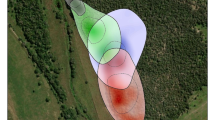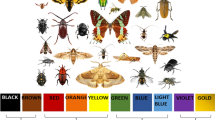Abstract
The house sparrow (Passer domesticus) is well known for conspecific brood parasitism in Europe, and there it is capable of recognizing and rejecting non-mimetic foreign eggs and even mimetic conspecific eggs. Here, we tested the egg rejection of an Asian population of house sparrows by using model eggs, sparrow eggs painted red and sparrow eggs with added brown spots, of which their mimicry to sparrow eggs were quantified by granularity analysis based on avian vision. Surprisingly, house sparrows in Asia did not show any egg rejection. We suggest that the evolutionary equilibrium theory, which was first proposed to explain the absence of egg rejection in some hosts of interspecific brood parasites, may explain the deficiency of egg rejection in house sparrows, as a result of trade-offs between the high rejection costs and the costs of raising conspecific foreign chicks.


Similar content being viewed by others
References
Anderson TR (2006) Biology of the ubiquitous house sparrow: from genes to populations. Oxford University Press, New York
Arnold KE, Owens IPF (1999) Extra-pair paternity and egg dumping in birds: life history, parental care and the risk of retaliation. Proc R Soc Lond B 269:1263–1269
Colombelli-Négrel D, Hauber ME, Robertson J, Sulloway FJ, Hoi H, Griggio M, Kleindorfer S (2012) Embryonic learning of vocal passwords in superb fairy-wrens reveals intruder cuckcoo nestlings. Curr Biol 22:2155–2160
Davies NB (2000) Cuckoos, cowbirds and other cheats. Poyser, London
Davies NB, Brooke ML (1998) Cuckoos versus hosts: experimental evidence for coevolution. In: Rothstein SI, Robinson SK (eds) Parasitic birds and their hosts. Oxford University Press, Oxford, pp 59–79
Davies NB, Brooke ML, Kacelnik A (1996) Recognition errors and probability of parasitism determine whether reed warblers should accept or reject mimetic cuckoo eggs. Proc R Soc Lond B 263:925–931
Griffith SC, Stewart IRK, Dawson DA, Owens IPF, Burke T (1999) Contrasting levels of extra-pair paternity in mainland and island populations of the house sparrow (Passer domesticus): is there an ‘island effect’? Biol J Linn Soc 68:303–316
Harvey PH, Pagel MD (1991) The comparative method in evolutionary biology. Oxford University Press, Oxford
Kendra PE, Roth RR, Tallamy DW (1988) Conspecific brood parasitism in the house sparrow. Wilson Bull 100:80–90
Liang W, Yang C, Wang L, Møller AP (2013) Avoiding parasitism by breeding indoors: cuckoo parasitism of hirundines and rejection of eggs. Behav Ecol Sociobiol 67:913–918
López-de-Hierro MDG, Moreno-Rueda G (2010) Egg-spot pattern rather than egg colour affects conspecific egg rejection in the house sparrow (Passer domesticus). Behav Ecol Sociobiol 64:317–324
López-de-Hierro MDG, Ryan PG (2008) Nest defence and egg rejection in the house sparrow (Passer domesticus) as protection against conspecific brood parasitism. Behaviour 145:949–964
Lotem A, Nakamura H, Zahavi A (1992) Rejection of cuckoo eggs in relation to host age: a possible evolutionary equilibrium. Behav Ecol 3:128–132
Lott DF (1991) Intraspecific variation in the social systems of wild vertebrates. Cambridge University Press, Cambridge
Manwell CLC, Baker MA (1975) Molecular genetics of avian proteins. XIII. Protein polymorphism in three species of Australian passerines. Austr J Biol Sci 28:545–557
Martín-Vivaldi M, Soler M, Møller AP (2002) Unrealistically high costs of rejecting artificial model eggs in cuckoo Cuculus canorus hosts. J Avian Biol 33:295–301
Moksnes A, Røskaft E, Braa AT, Korsnes L, Lampe HM, Pedersen HC (1991) Behavioural responses of potential hosts towards artificial cuckoo eggs and dummies. Behaviour 116:64–89
Møller AP, Birkhead TR (1994) The evolution of plumage brightness in birds is related to extra-pair paternity. Evolution 48:1089–1100
Møller AP, Soler JJ (2013) A coevolutionary framework based on temporal and spatial ecology of host-parasite interactions: a missing link in studies of brood parasitism. Chinese Birds 3:259–273
Moreno-Rueda G, Soler M (2001) Reconocimiento de huevos en el Gorrión común Passer domesticus, una especie con Parasitismo de Cría Intraespecífico. Ardeola 48:225–231
Rothstein SI, Robinson SK (1998) Parasitic birds and their hosts, studies in coevolution. Oxford University Press, Oxford
Soler M (2014) No evidence of conspecific brood parasitism provoking egg rejection in thrushes. Front Zool 11:68
Soler M, Ruiz-Castellano C, Fernández-Pinos MC, Rösler A, Ontanilla J, Pérez-Contreras T (2011) House sparrows selectively eject parasitic conspecific eggs and incur very low rejection costs. Behav Ecol Sociobiol 65:1997–2005
Stoddard MC, Stevens M (2010) Pattern mimicry of host eggs by the common cuckoo, as seen through a bird’s eye. Proc R Soc Lond B 277:1387–1393
Summers-Smith D (1964) The house sparrow. Collins, London
Takasu F (1998) Why do all host species not show defense against avian brood parasitism: evolutionary lay or equilibrium? Am Nat 151:193–205
Thompson JN (1994) The coevolutionary process. University of Chicago Press, Chicago
Thompson JN (2005) The geographic mosaic of coevolution. University of Chicago Press, Chicago
Underwood TJ, Sealy SG, McLaren CM (2004) Experiments on egg discrimination in two North American corvids: further evidence for retention of egg ejection. Can J Zool 82:1399–1407
Yang C, Stokke BG, Antonov A, Cai Y, Shi S, Moksnes A, Røskaft E, Møller AP, Liang W, Grim T (2013) Host selection in parasitic birds: are open-cup nesting insectivorous passerines always suitable cuckoo hosts? J Avian Biol 44:216–220
Yang C, Wang L, Cheng S-J, Hsu Y-C, Liang W, Møller AP (2014) Nest defenses and egg recognition of yellow-bellied prinia against cuckoo parasitism. Naturwissenschaften 101:727–734
Acknowledgments
We are grateful to Prof. Manuel Soler, Associate Editor, and four anonymous reviewers for providing constructive and valuable comments that significantly improved the quality of the manuscript. This work was supported by the National Natural Science Foundation of China (Nos. 31260514 to CY, 31272328 and 31472013 to WL), and Program for New Century Excellent Talents in University (NCET-13-0761 to CY).
Ethical standards
The experiments comply with the current laws of China, where they were performed. Fieldwork was carried out under the permission from Fukang National Field Scientific Observation and Research Station, Xinjiang Institute of Ecology and Geography, Chinese Academy of Sciences. Experimental procedures were in agreement with the Animal Research Ethics Committee of Hainan Provincial Education Centre for Ecology and Environment, Hainan Normal University.
Conflict of interest
We declare that all authors have no conflict of interest.
Author information
Authors and Affiliations
Corresponding author
Additional information
Communicated by M. Soler
Rights and permissions
About this article
Cite this article
Yang, C., Hu, Y., Ma, M. et al. Absence of egg rejection in an Asian population of house sparrow (Passer domesticus), a conspecific brood parasite in Europe. Behav Ecol Sociobiol 69, 723–727 (2015). https://doi.org/10.1007/s00265-015-1886-0
Received:
Revised:
Accepted:
Published:
Issue Date:
DOI: https://doi.org/10.1007/s00265-015-1886-0




